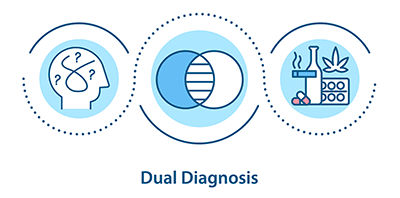What you want to know (in less than one minute):
- Drug addiction and mental health problems co-occur at a high rate. Half of the people who develop substance abuse during their lives will also be diagnosed with a mental health problem at some point.
- Addiction and mental illness impact similar areas of the brain, which may explain the relationship.
- Dual diagnosis of drug addiction and mental illness is challenging, meaning many people do not get the care they need.
- A combination of medical detoxification and mental health treatment is best for co-occurring addiction and mental illness.
The Connection Between Drug Addiction and Mental Illness

A variety of mental health conditions co-occur with substance abuse issues. For example, these conditions could include generalized anxiety disorder, panic disorder, post-traumatic stress disorder, depression, or ADHD. One of the most significant risk factors for dual diagnosis is serious mental illness such as schizophrenia or bipolar disorder. Moreover, there’s a strong association between these mental health problems and substance misuse and addiction.
Other risk factors for co-occurring substance abuse and mental illness include:
For over 26 years, people from all over the world have chosen Waismann Method as their opioid detox provider.
We know the challenges you face and the importance of creating a unique and personal experience for you right from the start.Call for Detox Options 1-800-423-2482
- Being male
- Unstable income or poverty
- Isolation
- Lack of social connections
- Family or relationship problems
- Unstable housing
- Family history of mental health problems or substance abuse
- History of trauma or abuse (this could be physical, emotional, or sexual abuse)
- Problems at school or work
Why Do Opioid Addiction and Mental Illness Co-Occur So Often?
Researchers have known for decades that mental health problems and addiction often go hand in hand. However, only recently have experts begun to understand why these problems are so tightly intertwined. Following are five areas of overlap between drug addiction and mental illness.
- Genetics. Some of the risks of developing substance abuse or a psychiatric disorder are coded in your genes. Studies across the entire human genome have discovered numerous genes involved in substance use disorders and mood or anxiety disorders. Most of these genes are involved in developing neurons (brain cells), brain connectivity, and signaling between cells.
- Epigenetics. Epigenetics is a newer area of science that investigates how the environment controls how and when specific genes are expressed. Repeatedly being exposed to certain drugs causes your body to “tag” certain genes with particular molecules. These molecules influence whether a gene is active or silent. Some of these changes can be passed on to the next generation, providing a method by which stress or trauma can affect future descendants.
- Brain pathways and chemicals. The brain regions involved in reward processing, decision making, emotions, and impulse control are affected by substance abuse. These same brain regions are also disrupted in mental health disorders. Brain chemicals such as dopamine, serotonin, norepinephrine, and GABA have been linked to both conditions.
- Stress. Stress puts a person at higher risk for substance misuse and addiction. This has been related to levels of stress hormones like cortical, which can cause brain changes that make a person vulnerable to addiction and psychiatric problems.
- Trauma. Trauma due to physical, sexual, or emotional abuse has lingering effects on the body and brain. People suffering from trauma often use opioids or other substances to self-medicate. This results in a short-term numbing of symptoms but increases the risk for drug addiction.
What Comes First
Treating patients with a dual diagnosis of addiction and mental illness is challenging. Part of the reason is that it can be challenging to determine which problem came first. Is drug abuse part of a symptom of the mental health problem? Or are mental health symptoms like depression or anxiety a reaction to addiction?
The answer is often that both of these things are true. Addiction and mental illness feed off one another in complex ways. For example, someone who becomes paranoid when using drugs may be experiencing the first episode of schizophrenia. Or someone suffering from depression may turn to drugs and alcohol to numb their emotional pain.
Treatment Complications for Co-Occurring Substance Abuse and Mental Illness
The tight relationship between drug abuse and mental illness makes treatment difficult. Both opioid addiction and mental illness are highly stigmatized. As a result, people are often reluctant to acknowledge that they have a problem. Only about a third of people with a dual diagnosis get mental health treatment, while only 1 in 10 get treatment for both conditions.
People seeking treatment for addiction and mental health problems often face a “chicken or the egg” problem. Mental health providers may be reluctant to treat someone who is actively using drugs. Meanwhile, many addiction treatment centers focus only on drug use and ignore mental health problems. This leads to failed treatments, frustration for patients, and missed opportunities for recovery.
Best Practices for Dual Diagnosis Treatment
The National Association for Mental Illness has outlined best practices for dual diagnosis treatment. They recommend that individuals undergo treatment for their addiction and mental illness simultaneously, rather than treating these as separate problems. In particular, treatment should include:
- Detoxification. Medical detoxification allows someone to detox from drugs or alcohol while receiving 24/7 medical support. A medical detox program is the best way to ensure a safe, compassionate transition away from substance use.
- Medication management. People dealing with mental health problems often benefit from medications to support their mental health. Using medications to treat symptoms of anxiety, depression, post-traumatic stress, mania, or psychosis is often critical to treatment success. Often, these medications rebalance levels of brain chemicals called neurotransmitters that get out of balance due to mental health problems or substance use.
- Psychotherapy. Psychotherapy is another essential part of the recovery process. The National Institute on Drug Abuse recommends behavioral or cognitive behavioral therapy approaches. These typically focus on understanding habits, learning new coping skills, and increasing motivation to change old behaviors. Both individual therapy and group therapy can help a person move toward recovery.
- The supportive transition back to a stable living environment. The transition from a substance abuse treatment program back to regular life is difficult for many patients. It becomes easy to fall back into old patterns or habits. That is why experts recommend a supportive, gradual transition. This emotional assistance might include continuing psychotherapy, accessing support groups, or including family members in the treatment plan.
Find the Help You Need
Co-occurring mental health problems and drug addiction are incredibly common. So, if you’re having mental health symptoms and difficulty controlling your drug use, know that you are not alone. Finding dual diagnosis treatment options can transform your physical and mental health. Reaching out is the first step toward a safe, healthy recovery from addiction.
WAISMANN METHOD® experts have more than 26 years of experience treating opioid use disorder. Our rapid detox drug treatment begins with a comprehensive assessment to better understand your substance use history, mental health, and physical well-being. This evaluation allows our health care professionals to create an individualized drug treatment protocol that best fits your unique health needs.
Sources
- NCBI: Integrated Treatment of Substance Use and Psychiatric Disorders
- Affinity Health Plan: Substance Abuse and Serious
Mental Illness (SMI) - National Institute on Drug Abuse: Common Comorbidities with Substance Use Disorders Research Report
- MDPI: Genetic Basis of Dual Diagnosis
- DualDiagnosis.org: Significant Statistics
- NAMI: Substance Use Disorders
- National Institute on Drug Abuse: Principles of Drug Addiction Treatment
Written by Aurora Harklute
Aurora is a neuropsychologist and freelance writer with more than ten years of experience with a bachelor’s degree in human physiology, a master’s degree in cognitive psychology, and a Ph.D. in clinical psychology. Aurora writes for a variety of industries within the substance abuse and medical fields. She also specializes in the impact of substance use on mood and cognition.
Reviewed by Clare Waismann, Registered Addiction Specialist (RAS), Substance Use Disorder Certified Counselor (SUDCC), founder of Waismann Method® Advanced Treatment for Opiate Dependence and Domus Retreat®. Clare Waismann is an authority and expert on opioid dependence, opioid use disorder, substance dependence, detoxification treatments, detox recovery, and other topics covered on RapidDetox.com.






